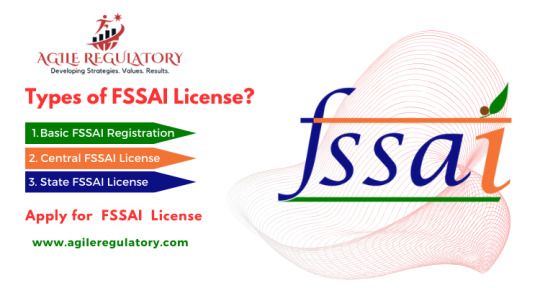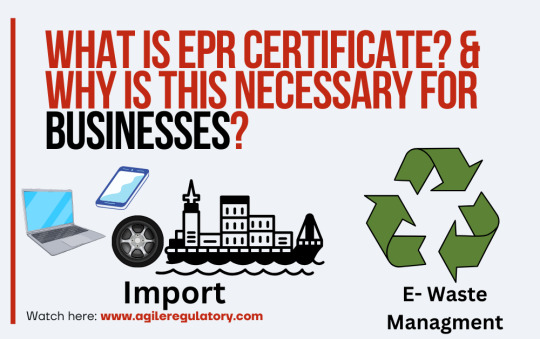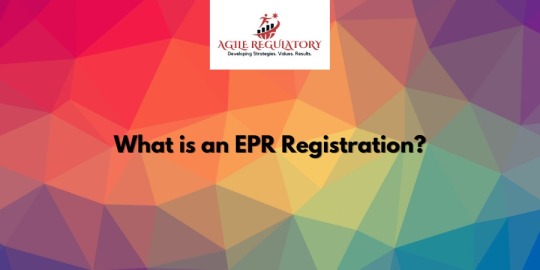Text

How to easily get EPR certification online: Learn about the simple registration process and what documents you require to obtain an EPR certificate. Please connect with an Agile Regulatory consultant for expert guidance in every single step.
0 notes
Text
How to Obtain FSSAI License in Noida?

FSSAI Registration in Noida
Owners of food businesses in India must apply for a license from the Food Safety and Standards Administration of India, or FSSAI. It is a government certification that ensures the food products are safe and meet strict guidelines.
To apply for an FSSAI License in Delhi NCR or Noida, the FBO must submit an application, either online or offline, to the Food Safety and Standards Authority of India (FSSAI). All pertinent information, including the type of license required, the type of Food Company, the location, the food items, and the number of employees, must be included in the application.
What is FSSAI Registration?
The Food Safety and Standards Act of 2006 created the FSSAI, a governmental entity. FSSAI's primary goal is to control and monitor the food sector in India in order to guarantee food safety and give consumers access to healthy, safe food. The FSSAI is in charge of establishing science-based guidelines for food-related items.
What are the types of FSSAI License?
Depending on the size and nature of the food industry, there are three different kinds of FSSAI licenses:
Basic FSSAI Registration: For small-scale food enterprises with an annual sale of less than 12 lakhs, this simple registration process is required. The State FSSAI office is responsible for issuing this kind of license.
State FSSAI License: Food businesses with an annual revenue of 12 lakhs to 20 crores must get this license. The State FSSAI office issues the license, which has a one-year validity period.
Central FSSAI License: This license is necessary for food businesses that deal in the import and export of food items and have an annual revenue of more than 20 crores. The Central FSSAI office issues the license, which has a five-year validity period.
Benefits of getting FSSAI License in Noida
Food enterprises must abide by the legal standards and regulations set out by the Food Safety and Standards Authority (FSSAI) in order to operate in a secure manner. The FSSAI registration in Noida gives your company several advantages over unregistered FBOs, such as –
It provides your company with an identity that makes it simple for customers to recognize your food products.
It also helps you build a strong brand image and boost brand value.
FSSAI registration is required for the import-export of food products.
Finally, it's crucial to have an FSSAI Registration in Noida if you want to sell food products on eCommerce portals.
Documents required for FSSAI Registration
The documents required for FSSAI Registration in Delhi NCR or Noida is mentioned below:
Proof of business registration, such as a certificate of shops and establishment or a GST registration certificate
Articles of Association (AOA) or Memorandum of Association (MOA) and a partnership deed, if required
PAN card
Voter ID cards or Aadhaar cards
Passport-size photograph
Plan for managing food safety
A written document that describes the FBO's food safety management strategy
Proof of ownership or a lease from the local government or organization for the space where the restaurant is located
List of food items that need to be produced or distributed
Report on a water test from an accredited laboratory
If necessary, a food testing result from an accredited laboratory
Affidavit showing adherence to all food safety and quality regulations by the food industry.
What is the process of FSSAI Registration?
The FSSAI license online process is discussed below:
The first step is to decide the type of FSSAI license you need for your food business.
Now, compile all the important documents required to complete the FSSAI license online process.
Then, you will be required to fill the required information and complete the application form.
Submit the documents and application on the FSSAI portal or to the concerned authorities and pay the FSSAI license fee.
After checking the application, documents, and the lab test reports, if everything is found correct, the authorities will issue the FSSAI license.
Why Choose Agile Regulatory?
Agile Regulatory can be your ideal FSSAI Consultant as we are aware that when it comes to registering an FSSAI license, time is of the importance. Because of this, we assure to provide timely services. You can leave everything on us, from updating documents to completing the registration process. We will handle all the technical issues, allowing you to concentrate on expanding your company.
#agileregulatory#FSSAI license#State FSSAI license#Central FSSAI license#FSSAI license Process#FSSAI license Consultant#FSSAI license Registration
0 notes
Text
What is the EPR Registration Process?

Overview of EPR Certificate
Companies that accept accountability for the full life cycle of their products—particularly about post-consumer waste management—are awarded the EPR Certificate. This certification shows a dedication to sustainable practices and environmental responsibility. It entails following legal standards, showcasing environmentally friendly product design, and actively taking part in waste reduction campaigns. A company's legitimacy is increased by EPR Certification, which promotes trust among stakeholders and customers. It guarantees adherence to environmental regulations and is consistent with global sustainability goals. In the end, it helps create a circular economy and demonstrates a company's commitment to excellence in environmental stewardship.
Role of CPCB
Central Pollution Control Board, which is in charge of monitoring and controlling environmental compliance in India, is essential to EPR certification. To make sure that businesses handle their products appropriately, CPCB creates standards and guidelines for extended producer responsibility (EPR). It keeps an eye on compliance with these rules, which cover appropriate recycling and trash disposal procedures. In order to preserve ecological sustainability, lessen the ecological impact, and encourage ethical business practices, the CPCB's engagement is essential. By virtue of its regulatory powers, CPCB helps ensure that businesses respect their environmental obligations and promotes a circular economy by helping to enforce EPR principles.
Types of EPR Certificate:
EPR Certificate for E-Waste
EPR Certificate for Plastic Waste
EPR certificate for Battery Waste
EPR Certificate for waste Tyres
EPR Certificate for E-Waste
EPR Registration for E-Waste means companies that make or sell electronic stuff must take care of their products even after we're done using them. They need to collect, recycle, and get rid of electronic waste in a way that's good for the environment. This helps to keep our surroundings clean, reuse materials, and make sure old electronic gadgets don't harm nature or people.
EPR Certificate for Plastic Waste
EPR Registration for Plastic Waste means companies need to take care of the plastic products they produce or sell. They must handle everything about these plastics, from making them to collecting, recycling, and properly getting rid of them when people are done using them. This is to keep our environment cleaner and reduce the problems caused by plastic waste. It's like a rule that companies must follow to be more responsible for the plastic things they create.
EPR certificate for Battery Waste
EPR Registration for Battery Waste means that companies are responsible for managing batteries from production to disposal. They have to ensure that batteries are collected, recycled, or properly disposed of after use. This helps prevent environmental harm and encourages companies to be more accountable for the impact of battery waste. In simple terms, it's a rule for companies to take care of the batteries they make, use, and sell, promoting better environmental practices.
EPR Certificate for Waste Tyres
EPR Registration for Waste Tyres means that companies are accountable for the entire lifecycle of tyres they produce or use. This includes proper disposal, recycling, or management of tyres after they are no longer in use. The aim is to reduce environmental impact and encourage responsible practices in handling tyre waste. In simple words, companies need to take care of the tyres they manufacture or use, ensuring they are disposed of in an environmentally friendly way.
Benefits of EPR Certification
1. Environmental Stewardship: By actively participating in the responsible management of product life cycles, the certificate indicates a commitment to environmental stewardship.
2. Regulatory Compliance: EPR Certification ensures that regulatory standards are met, lowering the risk of legal problems and penalties.
3. Enhanced reputation: Organizations who receive EPR Certificates show their dedication to sustainable and ecologically conscious business operations, which enhances their reputation.
4. Competitive Advantage: A company gains a competitive edge with certification, which demonstrates a dedication to responsible product management and increases the organization's appeal to stakeholders and environmentally sensitive consumers.
5. Incentives for Innovation: EPR promotes enterprises to develop in product design by supporting eco-friendly methods and lowering product environmental effects.
6. Decreased Financial and Legal Risks: EPR standards compliance reduces legal and financial risks by adhering to set standards for waste management and responsible product disposal.
7. Alignment with Global Goals: By encouraging ethical waste management and resource conservation, EPR Certification helps to achieve global sustainability goals.
8. Consumer Trust: By providing reassurance that the business is actively reducing its environmental impact, EPR Certification helps to build consumer trust.
9. Morale Among Staff: Positive corporate cultures are fostered and employee morale is raised when they work for organizations that practice social responsibility and environmental responsibility.
10. Community Relations: Businesses who possess EPR Certificates show a dedication to sustainable practices and environmental protection, which strengthens ties with the community.
Conclusion
Finally, the EPR Certificate is an important credential that goes beyond statutory compliance, indicating a company's dedication to environmental sustainability. It provides various advantages, including increased credibility, regulatory adherence, and a competitive advantage. EPR certification helps organizations fit with global sustainability standards, promotes innovation, and lowers legal and financial risks. Furthermore, it increases consumer trust, raises employee morale, and improves community connections. As businesses pursue responsible and sustainable operations, the EPR Certificate emerges as a sign of conscientious corporate citizenship, helping to create a healthier planet and a more sustainable future.
#epr#eprcertification#eprcertificate#eprlicense#eprauthorization#eprregistrationforewaste#eprregistrationforplasticwaste#eprregistrationforbattery#cpcb#eprewaste#eprelectronics#eprplastics
0 notes
Text
What is the BIS Certification? How much Important for the Businesses in India?
The BIS (Bureau of Indian Standards) Certification process encompasses multiple stages to verify that products adhere to defined quality and safety standards in India:
Product Identification:
Identify the specific product category for which BIS certification is required. Different products fall under different Indian Standards (IS) codes.
Understanding Standards:
Familiarize yourself with the applicable Indian Standards and technical requirements for the chosen product. Obtain these standards from the BIS website or its offices.
Applicant Eligibility:
Ensure that the applicant should be an individual or a company, is eligible to apply for BIS certification. Foreign manufacturers can also apply but may have additional requirements.
Creation of Account on BIS Portal:
Register on the BIS online portal by creating an account. Provide accurate details during the registration process.
Submission of Application:
Fill out the online application form available on the BIS portal. Provide comprehensive details about the product, manufacturing unit, and other relevant information.
Document Submission:
Upload the required documents, including the test report from a BIS-recognized laboratory, proof of manufacturing unit information, brand authorization letter (if applicable), and other necessary documents as specified for the product category.
Factory Inspection (if required):
In some cases, a BIS official may conduct an inspection of the manufacturing unit to ensure it complies with the standards and possesses the necessary infrastructure for quality production. This step is common for certain products like electronic items.
Testing of Samples:
BIS may select samples of the product for independent testing in their laboratories. The results should align with the specified standards.
Type Test Report:
For certain products, a Type Test Report from a BIS-recognized laboratory might be required. This report demonstrates that the product conforms to the standards and specifications.
Verification of Documents:
BIS will verify all the submitted documents and test reports. Any discrepancies may lead to a delay in the certification process.
Grant of BIS Certification:
If all requirements are met, BIS will grant the certification. The applicant will receive the BIS certification along with the right to use the ISI mark on their products.
Surveillance Audits (Post-Certification):
After certification, BIS may conduct periodic surveillance audits to ensure ongoing compliance with the standards.
Renewal of Certification:
BIS certification is typically valid for a specific period. Manufacturers must initiate the certification renewal process before its expiration, involving procedures similar to the initial certification, such as submitting updated test reports if necessary.
#biscertification#bis registration#bisregulatory#agileregulatory#bishallmark#biscertificate#bisecomark#bis#biscrs#bisisi
0 notes
Text

What is RNI Registration? How can a Newspaper Business get this Certificate?
Introduction:
The Registrar of Newspapers for India (RNI) registration stands as a crucial gateway for newspapers and publications in India, ensuring compliance with regulatory standards and fostering credibility in the dynamic media environment. Governed by the Press and Registration of Books Act, of 1867, this certification process is essential for legal recognition, access to government advertising, and upholding journalistic integrity.
Understanding RNI Registration:
RNI registration is a mandatory process designed to regulate and authenticate newspapers, periodicals, and magazines in India. The primary objective is to ascertain the authenticity and periodicity of publications, fostering transparency and accountability within the media industry.
Eligibility Criteria:
Before embarking on the application journey, publishers must ensure that their publication aligns with RNI's eligibility criteria. The publication should qualify as a newspaper, periodical, or magazine, adhering to minimum size requirements.
Digital Signature Certificate (DSC):
The application process involves online submissions, necessitating the acquisition of a Digital Signature Certificate (DSC) from authorized certifying agencies. The DSC ensures the security and authenticity of online transactions during the application process.
Creating an Account on the RNI Website:
Publishers initiate the process by creating an account on the official RNI website (https://rni.nic.in/). This account serves as the gateway to the online application portal.
Form I: Providing Comprehensive Information:
The heart of the application process lies in Form I, where publishers furnish detailed information about the publication. This includes the title, language, periodicity, circulation figures, and ownership details. Accuracy and completeness in filling out Form I are paramount for a smooth application process.
Uploading Supporting Documents:
To substantiate the information provided in Form I, publishers are required to upload several supporting documents. These may include an affidavit confirming compliance with the Press and Registration of Books Act, of 1867, a declaration of ownership, details of the printing press, and copies of the publication for a specified period to establish regularity.
Verification Process:
Following the submission of the application, RNI authorities may conduct a physical verification process. This may involve on-site visits to the printing press, confirmation of circulation figures, and a comprehensive check to ensure compliance with eligibility criteria.
Verification Certificate:
Upon successful verification, RNI issues a Verification Certificate. This document attests to the fact that the publication has been duly verified and is eligible for registration.
Payment of Fees:
With the Verification Certificate in hand, publishers proceed to the payment of prescribed registration fees. The fees vary based on factors such as the periodicity of the publication, language, and circulation.
Form II: Finalizing the Application:
Form II marks the final stage of the application process. Publishers submit this form along with the Verification Certificate and proof of payment. Form II reiterates key details from Form I and includes the Verification Certificate number.
Approval and Registration:
Once the application, verification, and payment processes are complete, RNI reviews the submission. If all requirements are met, RNI issues the official registration certificate. This certificate marks the successful culmination of the application process, officially registering the publication with RNI.
Periodic Renewal:
RNI certification is not perpetual; publishers are required to renew their registration periodically. This involves submitting updated information and ensuring continued compliance with regulatory standards.
Significance of RNI Certification for Newspaper Companies:
The RNI certificate holds multifaceted significance for newspaper companies operating in India. Firstly, it serves as a legal recognition of the publication, bolstering its standing in the media landscape. This recognition is crucial for establishing credibility and attracting readership.
Moreover, RNI certification opens doors to government advertising opportunities. Many government agencies prioritize advertising in registered publications, and being RNI-certified enhances a newspaper's eligibility for such lucrative opportunities. This not only acts as a substantial revenue stream but also reaffirms the publication's legitimacy.
Furthermore, RNI registration is a testament to a newspaper's commitment to ethical journalism. By adhering to regulatory standards and undergoing the verification process, newspapers demonstrate a dedication to responsible reporting, contributing to the overall trustworthiness of the media industry.
Conclusion:
In conclusion, the RNI registration process in India is a meticulous journey that ensures the authenticity, periodicity, and compliance of newspapers and publications. It serves as a cornerstone for legal recognition, access to government advertising, and upholding journalistic standards. Navigating this process requires diligence, accuracy, and commitment to regulatory compliance, ultimately contributing to a credible and accountable media environment in India. RNI certification not only bestows official recognition but also symbolizes a commitment to responsible journalism and transparency within the dynamic landscape of the Indian media industry.
#RNICertificate#RNIRegistration#RNIAuthorization#RNI#RNIdocuments#newspaperagency#newspaperbusiness#RNIfees
0 notes
Text
What is EPR Registration? How can we get EPR Authorization? What is registration and document required for EPR?

Overview of EPR Registration:
EPR Registration, in the context of environmental regulations, stands for Extended Producer Responsibility Registration. It is a mechanism established by many countries to hold producers accountable for the entire life cycle of their products, especially those that may have environmental implications. The concept places responsibility on manufacturers, importers, and brand owners to manage the environmental impact of their products, from production to disposal.
Under EPR Registration, businesses are required to register with relevant environmental authorities and comply with specific regulations aimed at reducing the environmental footprint of their products. This often involves implementing recycling programs, waste management strategies, and adopting eco-friendly production practices. The registration process typically necessitates the submission of detailed plans outlining how the producer intends to manage and mitigate the environmental impact of their products.
EPR Registration promotes sustainable and responsible business practices, encouraging producers to adopt measures that minimize waste generation and promote recycling. It aligns with global efforts to address environmental challenges and transition towards a more circular economy, where the life cycle of products is carefully managed to reduce ecological harm and promote resource efficiency.
Importance of EPR Registration
To obtain EPR certification, businesses typically need to follow specific procedures outlined by relevant environmental authorities in their jurisdiction. This may involve submitting detailed plans outlining how the company intends to manage the environmental impact of its products throughout its life cycle. The certification process often includes compliance with regulations related to waste management, recycling, and sustainable practices. Companies should reach out to the appropriate environmental agencies or regulatory bodies, familiarize themselves with the EPR requirements applicable to their industry, and undergo the necessary assessments to achieve EPR certification.
Extended Producer Responsibility (EPR) is crucial for businesses as it places a significant emphasis on environmental sustainability and corporate responsibility throughout the entire life cycle of products. By holding producers accountable for the environmental impact of their goods, EPR encourages businesses to adopt more eco-friendly practices, contributing to a more sustainable and circular economy.
One of the key benefits for businesses is that EPR helps in the efficient management of waste. Manufacturers are incentivized to incorporate recycling and end-of-life factors into product design, resulting in a decrease in overall waste generation. This not only conforms to environmental objectives but also mitigates potential extended expenses linked to waste disposal in the long run.
Furthermore, EPR fosters innovation as businesses seek environmentally friendly solutions and technologies to comply with regulations. This drive for innovation can enhance a company's competitiveness and market positioning, especially as consumers increasingly prioritize environmentally responsible products and services.
Engaging in EPR initiatives also helps businesses build a positive public image. Consumers are more likely to support companies that demonstrate a commitment to environmental stewardship, fostering brand loyalty and attracting environmentally conscious customers.
In summary, EPR is important for businesses as it promotes environmental responsibility, waste reduction, innovation, and positive public perception, aligning with the growing global emphasis on sustainable business practices.
Which Business is eligible for the EPR Registration..?
EPR Registration is typically required for companies involved in the production, import, or branding of products that have environmental implications throughout their life cycle. This includes manufacturers, importers, and brand owners of items such as electronics, packaging materials, batteries, and other goods with environmental footprints. Industries producing products that result in significant waste or have the potential to harm the environment are often subject to EPR regulations.
Companies in sectors like electronics, automotive, packaging, and chemicals commonly require EPR Registration to ensure they actively participate in managing the environmental impact of their products. Compliance with EPR regulations is essential for businesses to demonstrate environmental responsibility, meet legal requirements, and contribute to sustainable practices in line with global environmental goals.
Types of EPR registrations :
Extended Producer Responsibility (EPR) registration involves various types, reflecting the diversity of products and industries. Here, we explore several types of EPR registrations:
1. Electronic Waste (e-Waste) EPR Registration:
In many jurisdictions, electronic products fall under specific EPR regulations due to their potential environmental impact. This registration ensures proper disposal and recycling practices to manage the hazardous components found in electronic products.
2. Packaging Waste EPR Registration:
Packaging materials contribute significantly to the global waste stream. Packaging waste EPR registration targets businesses responsible for packaging design, production, or import. These companies are obligated to manage the end-of-life disposal or recycling of packaging materials, promoting sustainable packaging practices.
3. Battery EPR Registration:
Batteries pose environmental risks due to the presence of hazardous materials. EPR registration for batteries applies to manufacturers and importers of batteries. This registration ensures that businesses have systems in place for the proper collection, recycling, or disposal of batteries, reducing the environmental impact of battery waste.
4. Automotive EPR Registration:
In the automotive industry, EPR registration may focus on end-of-life vehicle management. Manufacturers and importers are required to register to ensure that proper recycling and disposal procedures are in place for vehicles reaching the end of their operational life.
5. Pharmaceutical EPR Registration:
Pharmaceutical companies may be subject to EPR registration to address the proper disposal of expired or unused medications. This registration aims to prevent pharmaceuticals from entering water systems and ecosystems, emphasizing safe and environmentally responsible disposal practices.
6. Paint EPR Registration:
EPR regulations for paint focus on the responsible management of leftover paint products. Manufacturers and importers of paint are required to register to ensure the proper collection and disposal of unused or expired paint, minimizing the environmental impact of hazardous paint materials.
7. Textile EPR Registration:
The textile industry may face EPR registration related to the disposal and recycling of textiles. Companies involved in the production or import of textiles are obligated to implement processes for the proper handling of textile waste, promoting a more sustainable approach to the fashion industry.
8. Lighting EPR Registration:
Lighting products, especially those containing hazardous materials like mercury, may require EPR registration. This ensures that manufacturers and importers have systems in place for the safe and responsible disposal or recycling of lighting products.
9. Tire EPR Registration:
The tire industry may be subject to EPR registration to address the proper management of end-of-life tires. Companies involved in tire manufacturing or importation must register to establish processes for recycling or disposing of used tires in an environmentally friendly manner.
10. Multi-Material EPR Registration:
Some jurisdictions adopt a comprehensive approach by implementing multi-material EPR registration, covering a range of products and materials. This type of registration requires businesses to manage the environmental impact of multiple product categories, promoting a holistic and integrated approach to extended producer responsibility.
Conclusion
In conclusion, EPR registration varies across industries, reflecting the unique environmental challenges posed by different products. The overarching goal is to encourage responsible product lifecycle management, waste reduction, and sustainable practices across diverse sectors.
To obtain EPR certification, businesses typically need to follow specific procedures outlined by relevant environmental authorities in their jurisdiction. This may involve submitting detailed plans outlining how the company intends to manage the environmental impact of its products throughout their life cycle. The certification process often includes compliance with regulations related to waste management, recycling, and sustainable practices. Companies should reach out to the appropriate environmental agencies or regulatory bodies, familiarize themselves with the EPR requirements applicable to their industry, and undergo the necessary assessments to achieve EPR certification.
#epr #eprregistration #eprregulatory
0 notes
Text
PSARA, or the Private Security Agencies Regulation Act, is an Indian legislation enacted in 2005 to regulate private security agencies. This law ensures that these agencies adhere to prescribed standards, licensing procedures, and training requirements. PSARA mandates background checks for personnel, defines guidelines for equipment usage, and establishes a framework for accountability. The primary objectives include fostering transparency and accountability within the private security sector. By doing so, PSARA safeguards the interests of clients and employees, playing a vital role in maintaining public order, protecting property, and enhancing overall security infrastructure across diverse sectors in India.
https://www.agileregulatory.com/service/psara-license-for-private-security-agency
#psara #psararegulatory #psararegistration #psarafees
#psaradocument #agileregulatory
0 notes
Text

The PSARA license, or Private Security Agencies Regulation Act license, is a mandatory legal requirement in India for entities offering private security services. Enforced since 2005, this license is issued by state government authorities and ensures that private security agencies comply with standardized regulations. It mandates adherence to professional standards, codes of conduct, and comprehensive background checks for personnel. The PSARA license is integral to maintaining a balance between the escalating demand for private security services and the critical need to uphold public safety and order. Without this license, private security agencies are prohibited from providing services, underscoring the importance of regulatory compliance in the security industry.
https://www.agileregulatory.com/service/psara-license-for-private-security-agency
#psara#psararegulatory#psararegistration#psaralicence#psaraldocuments#agileregulatory#private security#psarafees
0 notes